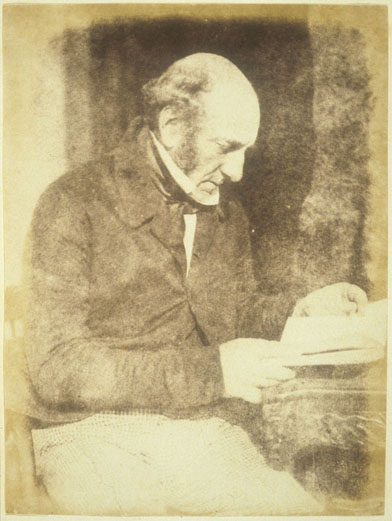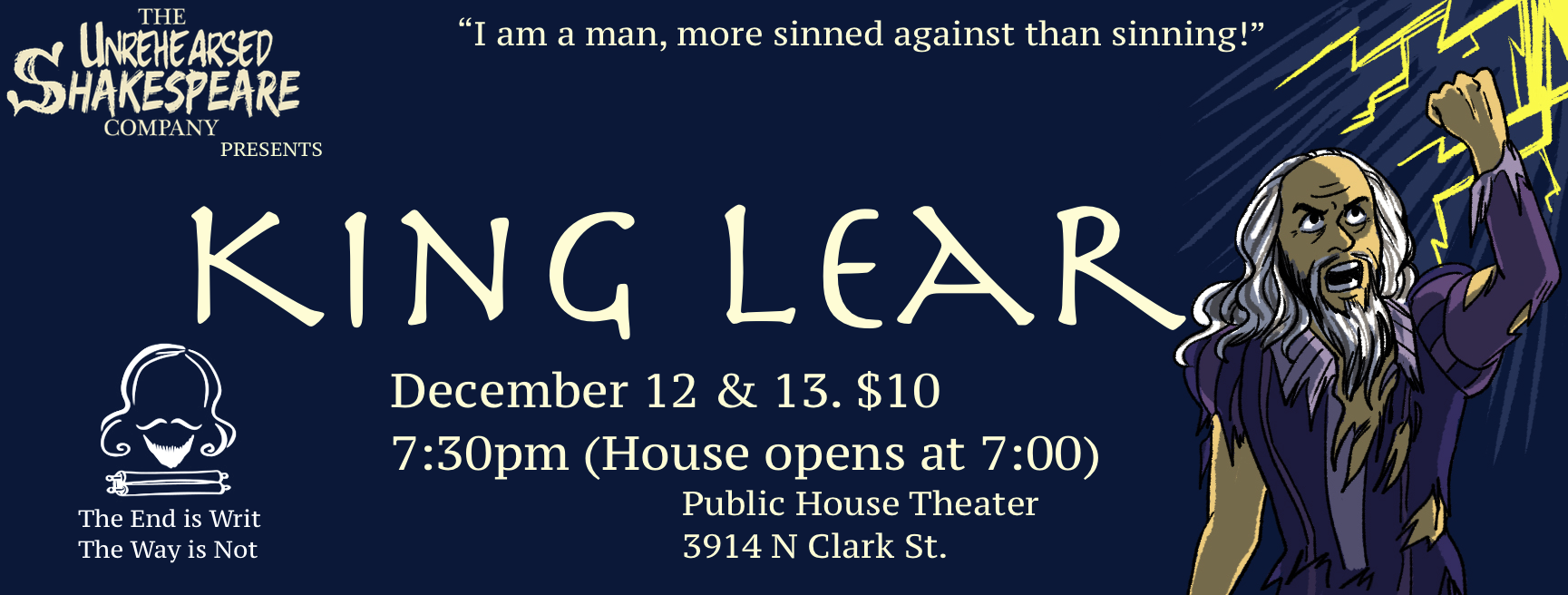A spotlight rises to reveal three queens: GONERIL, REGAN, and CORDELIA. They are standing shoulder to shoulder. Each has her right arm stretched out and up before her. They are grasping a single brilliant coronet between them. After a moment’s struggle, the coronet breaks in three. Each queen clutches a fragment to her chest.
Slowly, the lights expand to reveal a barren heath. There we see three resplendent kings and three resplendent coteries of nobles. Conveniently, they are color-coordinated: green for Goneril, red for Regan, and (disappointingly) gold for Cordelia.
They look at each other.
GONERIL
Let’s never let power come between us.
REGAN
Seems like an odd thing to say right out the gate.
CORDELIA
Charles. (her king approaches) Expand our troops to the northern and western lines. Recreate the third division as my personal guard and bring them up at once.
CHARLES, the King of France, nods and leaves, taking two French soldiers with him.
GONERIL
Expand your troops?
REGAN
Don’t you trust us?
CORDELIA
“Trust, but verify” is the motto de jour. I am seizing central Britain. The contested lands are contested no longer. Goneril, you and your lord Albany shall march North and return to Scotland: you have ruled there happily for several years and may continue to do so. Regan, you and your lord Cornwall shall reboard your ships and turn back to Ireland. See that no rebellion is fomented on that green isle. I shall reign in the central Britain and Wales. Any disputes that arise between the two of you shall be mediated by me, here on our central throne. Seeing as there is a literal sea dividing you, no such contentions are anticipated.
GONERIL
Why come you get France and England and Wales?
REGAN
Daddy said the land should be divided up equally.
CORDELIA
Equality is a myth, or at best a philosophical axiom. It has little application in the real world.
GONERIL
Nuh uh!
CORDELIA
While we stand here bickering, my forces are solidifying. I have made my decisions. You are free to make yours. We shall see whose worldview prevails.
CORDELIA’S private guard arrives. They are intimidating.
REGAN
Well, my worldview is that you’re a asshole!
CORDELIA
Noted.
GONERIL
How come you get the throne?
CORDELIA
I am the only queen who makes decisions using reason. Because of this, I believe I deserve central power. I will make more rational and balanced decisions than either of you.
GONERIL
Are you calling me stupid?
CORDELIA
If that’s the word you want to use, then fine.
GONERIL
I can’t believe you called me that! You are so mean!
CORDELIA
Do you think you would make a better ruler than I would?
GONERIL
Yes!
CORDELIA
Why?
GONERIL
Cause I wouldn’t be such a cock-head!
CORDELIA
And that’s your definition of a good ruler? Someone who is nice?
GONERIL
Yes!
CORDELIA
Well let’s test that theory. Men! Hold this ground (indicates a spot). Repel my sisters from this immediate area.
The French troops advance and drive the other sisters away.
REGAN
Stop!
GONERIL
Don’t be a cock-head! Why is everyone such a cock-head! You’re all head-cocks.
CORDELIA
It appears my methods are more effective.
REGAN
Can’t we all just get along?
CORDELIA
If you are content with Ireland, and you with Scotland, then yes, we can get along.
GONERIL
That’s not fair!
CORDELIA
I already addressed that issue.
REGAN
Come on, be real. Why are you being this way?
CORDELIA
It is effective and efficient.
REGAN
Why are you so upset?
CORDELIA
I am not upset. I am a superior ruler, and I am taking this land. I have already explained why.
REGAN
Is it cause Goneril called you a cock-head?
GONERIL
Cause she is one!
CORDELIA
That didn’t happen until after I made my claim.
REGAN
So what’s wrong?
CORDELIA
The only thing wrong is that you are refusing to accept my terms, yet you have offered no justification for your counterclaim.
REGAN
I think this would all smooth over if we could all just be respectful of one another.
GONERIL
Yeah, fucker!
CORDELIA
I am not the one calling anyone names.
REGAN
There’s no need to be offended.
CORDELIA
I am not offended. You are making irrational and unfounded claims, and I am pointing them out. Moreover, you are distracting from the central point of this argument. You want the central throne, but still have offered no justification for why you deserve it.
REGAN
Why are you being this way?
CORDELIA
I want the throne, and I believe I deserve it. If there are not counterpoints, I will consider it mine.
GONERIL
Fuck you, you fucking Nazi!
REGAN
Why are you being so inconsiderate?
CORDELIA
I have already addressed that issue. You are refusing to listening to me while simultaneously projecting your own irrationalities onto me.
REGAN
If you would just apologize, we could lay this whole thing to rest.
CORDELIA
I have done nothing that warrants apology. I have work to do, and I want to get to it.
REGAN
Well fuck you! You fuckin’… Cock-head! Cock-head!
CORDELIA
All right, well, when you’ve calmed down, we can reopen negotiations. Until then, I insist you retreat to your own seats of power. Men!
The Troops push the sisters back. They continue to shout the same insult over and over. Eventually, they vanish.
CORDELIA
Oh, what a fertile promontory.
END

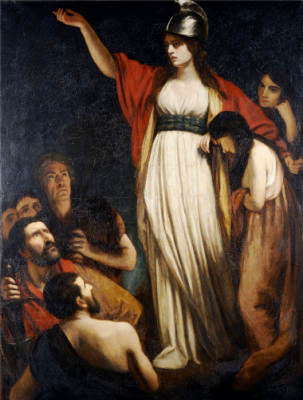
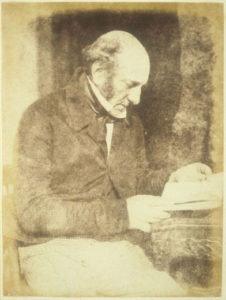
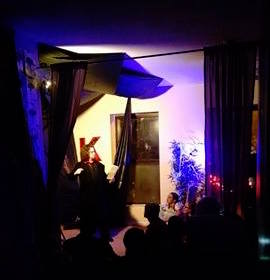
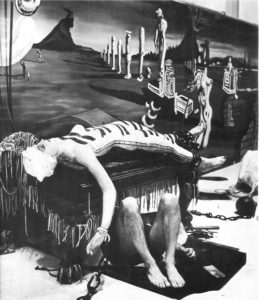 Milwaukee’s Truepenny Theater Company presents a vibrant and entertaining dip into the pool of Absurdism in their production of Savannah Reich’s Dali’s Liquid Ladies. Although much of their time is spent in cloyingly light (and consistently hilarious) performances that might more accurately be called parodies of Absurdism (or Dadaism, or whatever “weird” you choose), those parodies are refreshingly entertaining throughout. The brief moments of sincerity are effective if a bit weakly performed, but it is in fact the overarching comedic plot that displays a darker truth about the real relationship between absolute freedom and art in the real world.
Milwaukee’s Truepenny Theater Company presents a vibrant and entertaining dip into the pool of Absurdism in their production of Savannah Reich’s Dali’s Liquid Ladies. Although much of their time is spent in cloyingly light (and consistently hilarious) performances that might more accurately be called parodies of Absurdism (or Dadaism, or whatever “weird” you choose), those parodies are refreshingly entertaining throughout. The brief moments of sincerity are effective if a bit weakly performed, but it is in fact the overarching comedic plot that displays a darker truth about the real relationship between absolute freedom and art in the real world.